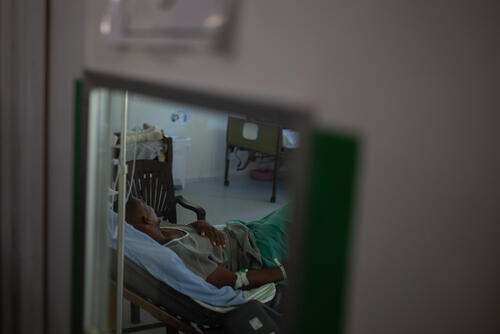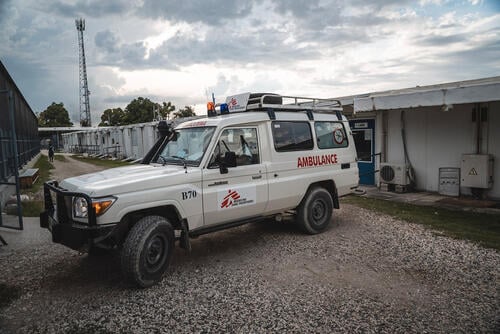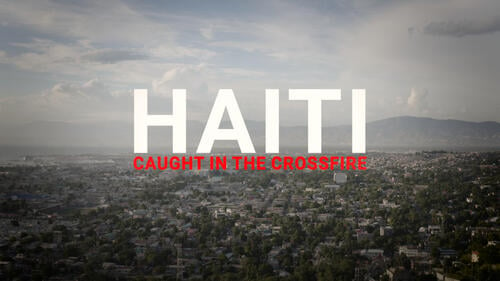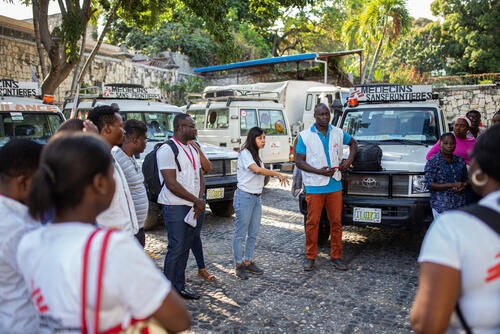Port-au-Prince - Recent incidents involving Médecins Sans Frontières (MSF) teams and activities in Port-au-Prince, Haiti, as well as serious threats circulating on social media, are jeopardising the safety of MSF staff and patients treated in our facilities, and our ability to provide care in the country.
On the night of 23 February, hooded gunmen attempted to break into the MSF hospital in Tabarre, a neighbourhood of Haiti’s capital Port-au-Prince.
“Unidentified individuals pointed their weapons at staff and banged on the door before attempting to scale the wall to enter the hospital compound,” says Mahaman Bachard Iro, MSF coordinator in Haiti, who says the individuals then left the premises. “We ask all parties to respect the medical mission we have, even as MSF remains one of the last international organisations still delivering care in the Haitian capital.”
Earlier in the day on 22 February, entrances and exits to the MSF emergency centre in Turgeau were blocked and an ambulance searched. Refusing to lay down their weapons, police then entered the facility to check the identity of all registered patients.
A few weeks earlier, on 7 February, another incident occurred when a clearly marked MSF ambulance was stopped and searched. Weapons were pointed at the vehicle’s passengers to check their identities, stopping the ambulance for more than 45 minutes, before it was allowed to resume its journey.
It is becoming increasingly difficult to work in these conditions, and the recurrence of these incidents is endangering the safety of our medical staff and patients.Mahaman Bachard Iro, MSF coordinator in Haiti
In addition, two violent clashes between armed groups have occurred since the beginning of the year just metres from the MSF hospital in Cité Soleil, resulting in the temporary closure of consultations and the brief evacuation of some staff. In the face of these repeated and disturbing clashes, and the fact that the front line between armed groups is getting closer to the hospital, MSF fears that we will no longer be able to work safely in providing medical care to people.
“It is becoming increasingly difficult to work in these conditions, and the recurrence of these incidents is endangering the safety of our medical staff and patients,” says Bachard Iro. “These repeated obstacles to our teams to transfer patients from one hospital to another, these violent intrusions into our medical facilities, and the crossfire at the gates of our healthcare facilities, seriously threaten the continuity of our activities.”
We temporarily closed our hospital in the Drouillard neighbourhood of the city in April 2022; permanently closed the doors of our emergency centre in Martissant in June 2021; and suspended our support to the Raoul Pierre Louis hospital in Carrefour in January 2023 for security reasons.
MSF teams have been present in Haiti for 30 years, treating all patients in need of care in an impartial manner. We urge all parties to respect our medical mission, including patients, caregivers, hospitals and the ambulances that transport them. In this difficult context, the entire Haitian health system is on the verge of collapse, as many health structures can no longer function properly. We also restate our commitment to the Haitian community, who are the first victims of the violence that has torn the country apart for years.
In 2022, MSF teams, in collaboration with the Ministry of Health, performed more than 4,600 surgical interventions, gave 34,200 emergency consultations, treated 2,600 gunshot wounds, 370 burn victims, and carried out 17,800 consultations in mobile clinics, 2,300 victims of sexual violence and 700 deliveries. Since the first case of cholera arrived in late September 2022, our teams have also treated more than 19,000 people.






